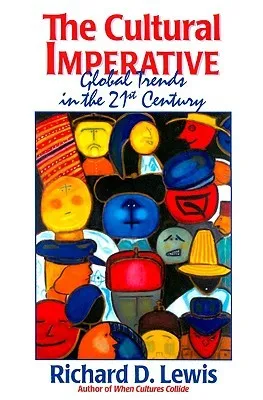The Cultural Imperative: Global Trends in the 21st Century
By (author): "Richard D. Lewis"
Publish Date:
2002

ISBN193193035X
ISBN139781931930352
AsinThe Cultural Imperative: Global Trends in the 21st Century
Original titleThe Cultural Imperative: Global Trends in the 21st Century
Will the tidal wave of globalization homogenize the world? Or will culture, which drives human behavior, maintain its influence?In The Cultural Imperative: Global Trends in the Twenty-first Century, Richard D. Lewis explores these questions and examines the forces that keep us tied to our cultural heritage. According to Lewis, throughout history and across the globe, we all have worn cultural spectacles, glasses tinted with our own cultural biases. These glasses ensure that our individual cultural traits will always be a part of us, as they are a part of the very way in which we see the world.As he examines the world after 9/11, with focus on the rise of Islam and the current state of the West, Lewis disproves the theory of inevitable globalization and identifies the forces that ensure that cultural perspective will always play a role in our lives.Richard Lewis's approach has been an absolutely marvelous way to get my students to appreciate how and why cultures are different, and how to benefit from this. It is great to see him now turn his practical wisdom to the future in such a spellbinding, readable and timely new book. A real imperative for understanding cultural trends! -Ulla Ladau-Harjulin, Principal Lecturer FRSA, Swedish School of Economics and Business Administration, Helsinki, Finland A very revealing and sometimes shocking vision of confrontation and/or cooperation of world cultures in the twenty-first century. A must-read in MBA programs and to be highly recommended to everyone involved with the study or practice of cross-cultural interaction and management. -Peter N. Shikhirev, PhD, Director, Centre for Social and Psychological Studies, Graduate School of International Business, Academy of National Economy by the Government of Russia Richard Lewis has developed a rich and powerful tool that serves to disseminate cultural complexities, which allows for leveraging opportunities and minimizing threats. Such issues would be paramount in any international business situation. A global mindset is imperative for us all. -Marta Szabo White, Ph.D., Assistant Professor, J. Mack Robinson School of Business, Georgia State University [The] thesis of the book is the argument linking cultural dimensions of nations to national competitive advantage. Richard Lewis develops a simple yet convincing model for understanding the historical evolution of the major national cultures and their juxtaposition to the rest of the world to day. The value of [The Cultural Imperative] is its new way of weaving a new explanation for considering the role of national cultures, language development, national aspirations and history in understanding the sources of future conflicts relating to global economic development. -Arie Y. Lewin, Professor, Director Center for International Business Education and Research, The Fuqua School of Business, Duke University Richard Lewis' extensive experience and knowledge of many cultures provides rich anecdotes coupled with interesting insights and opinions. The book stimulates personal reflection on the continuing importance of culture in a globalizing economy. -Susan Schneider, Chaired Professor of Human Resource Management, HEC University of Geneva ContentsPrefaceAcknowledgmentsIntroduction: Genetic, Economic, and Cultural Determinism1 From 2,000,000 B.C. to A.D 2000: The Roots and Routes of Culture2 Culture and Climate3 Culture and Religion4 Cross-Century Worldviews5 Cultural Spectacles6 Cultural Black Holes7 Cognitive Processes8 The Pacific Rim: The Fourth Cultural Ecology9 The China Phenomenon10 Americanization versus Asianization11 Culture and Globalization12 Empires- Past, Present, and FutureConclusionEpilogueAppendix A: Cultural Categorization CharacteristicsAppendix B: Leadership TestAppendix C: National TraitsAppendix D: National Communication StyleGlossaryBibliographyAbout the AuthorIndex